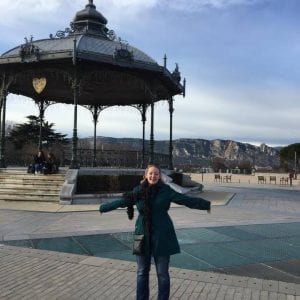Tera is a current student who is enrolled in LTS as a concurrent degree with her Ph.D. program in Comparative Literature. Her MA project focuses on the integration of postcolonial and diasporic literature in university ESL courses.
What inspired you to do an MA in LTS?
I decided to do an MA in LTS after two years as an Italian GE in the Department of Romance Languages. I’m completing my Ph.D. in Comparative Literature and I’ve loved being able to teach both language and literature classes at UO. I applied to the LTS program because I wanted to develop a more comprehensive knowledge of SLA and best practices in the language teaching field. LTS has also empowered me to better understand and articulate my own philosophy for teaching in a foreign language. And I’ve enjoyed taking LT classes while teaching French this year, because it has encouraged me to be a more reflective teacher every day.
You have learned and taught more than one second language – what have you enjoyed most about these experiences?
I feel very fortunate that I’ve had the opportunity to experience different language teaching contexts and approaches as both a learner and an instructor. Last year, I taught English at a high school in France and the teachers I worked with requested that I not tell the students I speak French so that they would be forced to communicate with me in English. It was a rare opportunity for me to teach my native language in a context where all the students shared an L1 that was my L2. As a French and Italian instructor at UO, I’ve primarily taught students who share my L1 and are acquiring an L2. In these contexts, I can share my own L2 experiences with my students (i.e. my very clear memory of being introduced to the French subjunctive for the first time!) and brainstorm with them strategies for maximizing exposure to these languages while living in the U.S. In the summer of 2015, I studied Arabic at the Middlebury Language School. This was my first ever experience in an immersion program that required each participant to sign a pledge not to use any language other than the target language. The pledge is reinforced by the fact that you are surrounded by the language all day every day. My Arabic improved dramatically in this program, allowing me to better appreciate and advocate for the Romance Language department’s policy of speaking only in the target language even from the first day. I think that an immersion approach is particularly important in a FL context because the amount of input the students receive in those contexts is limited. All that is to say: I’ve most enjoyed these experiences for how different they are. The different contexts and students I’ve encountered have taught me to be a more adaptive and receptive language learner and teacher, which I hope can benefit my future students (wherever I end up!).
How do your two graduate degrees interrelate, from your perspective?
I believe that Comparative Literature and LTS have great potential for collaboration. In Comparative Literature, one of our departmental requirements is to be able to teach across at least three national and linguistic traditions. It has been one of the rewarding experiences of my academic career to share COLT seminars with scholars who specialize in different languages, historical contexts, media and texts. We all bring different strengths to the program. In LTS, I have had similar experiences learning from teachers of less commonly taught languages and visiting Fulbright scholars. I feel that both programs are flexible and inclusive, with a curriculum and faculty that encourage students to chart their own path through the program. The result of this department support from LTS and COLT is that both my MA project and my dissertation reflect who I am and what I have to offer as a scholar and a teacher.
Are there some related themes across the work you are doing across the two programs?
Both my MA project and my dissertation engage with points of contact between languages and the highly contextualized strategies of multilingual speakers. The literary texts I look at in my dissertation are explicitly concerned with linguistic imperialism and the way that language can function as a form of resistance or as a tool of oppression. Research for my MA project has introduced me to Critical Applied Linguistics and Critical CALL, fields which have opened new avenues for dissertation research. Exploring the intersections between literary criticism and applied linguistics has strengthened both projects, and I see myself continuing to draw on both degrees in my trajectory as a teacher and a scholar. LTS and COLT are a great match!
Thank you, Tera, and good luck with your last months in school this summer!


